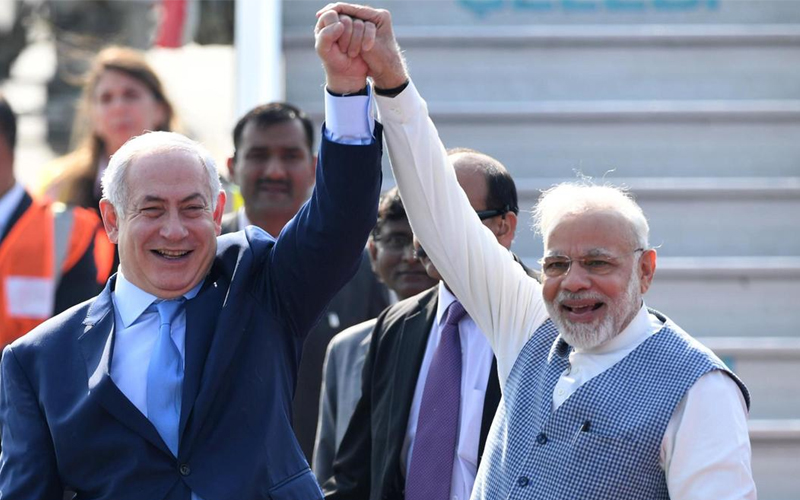
On the morning of October 7, the world was taken aback by surprising Hamas attack on Israel. Thousands of rockets were launched from the Gaza Strip, and Hamas fighters entered Israeli ‘territory’ by land and sea, killing hundreds of Israeli forces. The action triggered a war between Hamas and Israel, in which Palestinians living in Gaza, mostly children, have become the biggest casualty. So far, the death toll of Palestinians from Israeli airstrikes on the Gaza Strip has risen over 5,000.

Soon after the Hamas attack, Indian Prime Minister Narendra Modi expressed solidarity with Israel. He was quick to post on X: “Deeply shocked by the news of terrorist attacks in Israel. Our thoughts and prayers are with the innocent victims and their families. We stand in solidarity with Israel at this difficult hour (sic).”
India’s balancing act
On October 13, nearly six days after the conflict broke out, India released its first official statement on Palestine saying there was a “universal obligation to uphold humanitarian principles.”
In its statement, the ministry of external affairs recognised Palestine as a state living within ‘secure and recognised’ borders. “Our policy in this regard has been long-standing and consistent. India has always advocated the resumption of direct negotiations towards establishing a sovereign, independent, and viable state of Palestine living within secure and recognized borders, side by side, at peace with Israel,” the statement said.
However, India’s relationship with Israel and Palestine has fluctuated significantly since 1947. From the early days of its independence, India found its foreign policies oscillating between Israel and Palestine, considering its own national interests and a the sentiments of a large Muslim population.
1948: Israel is born
Amidst the chaos of the World War II, a massive influx of Jewish immigrants escaping persecution in Europe arrived in Palestine. The population shift sowed the seeds of tension between the two communities.
In 1947, tensions peaked as the United Nations proposed a Partition Plan, suggesting separate Arab and Jewish states. It proposed that 56% of Palestine’s fertile land go to the Jews. At that time, the Palestinians owned 94% land of Palestine and comprised 67% of its population.
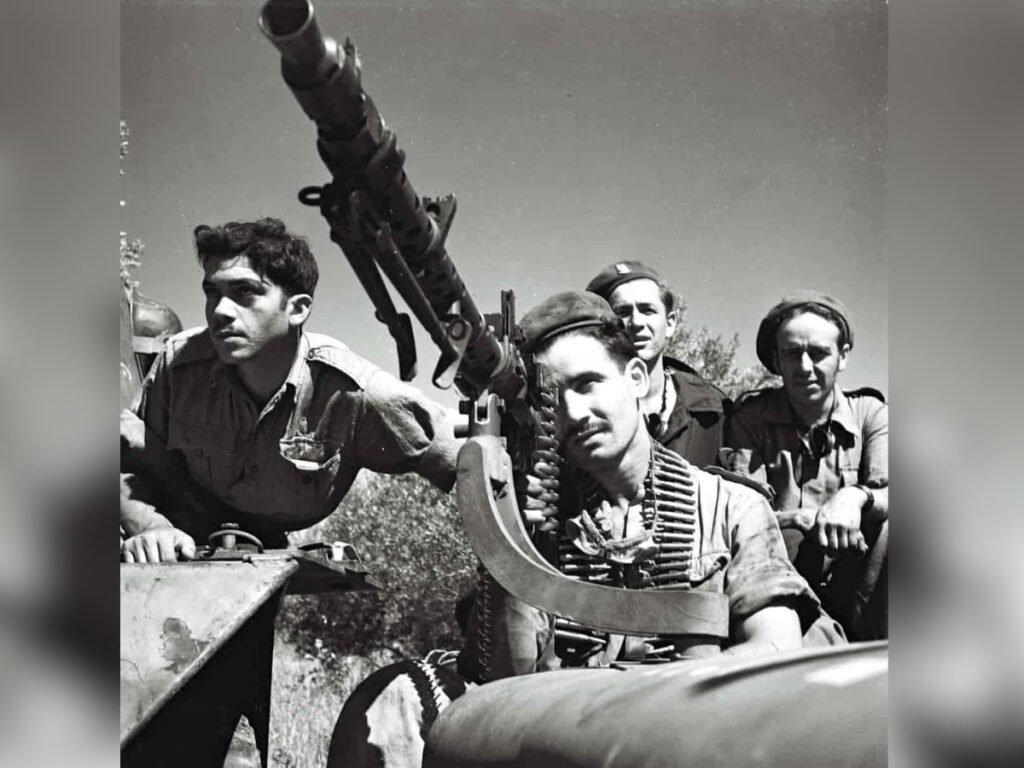
The Arabs rejected this plan, but the Jews accepted it. This triggered the first Israel-Palestine war resulting in a catastrophic event known as the Nakba (Palestinian Catastrophe) and eventually marked the birth of Israel in 1948.
Eventually, Israel termed itself an independent nation capturing 78% of Palestinian land while the remaining 22% was divided into what are now the occupied West Bank and the besieged Gaza Strip.
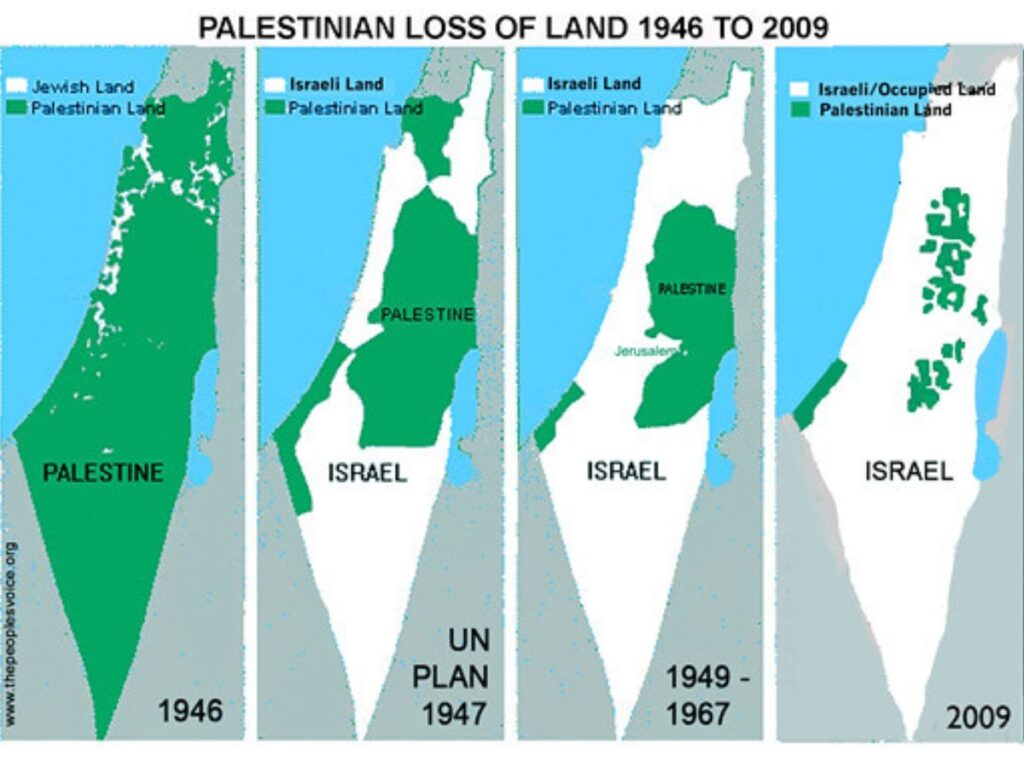
India and Palestine
Despite their sympathy for the Jewish population, Mahatma Gandhi and India’s first Prime Minister Pandit Jawaharlal Nehru rejected the UN’s Partition Plan of a religiously exclusive state. Their stance was rooted in the belief that any state based on religious exclusivity could not sustain itself on moral and political grounds. India’s exhibited this stance during the crucial 1947 UN vote.
In 1964, the Palestine Liberation Organisation (PLO), a political organisation that claimed to be the official representative of the Palestinian people, was formed. It was headed by Yasser Arafat from 1969 to 2004.
In 1975, under Indira Gandhi’s prime ministerialship, India recognised PLO by setting up an office in New Delhi. The Indo-Palestine relationship reached an all-time high after Indira Gandhi spoke about India’s support to the Arab nation, saying “we feel that injustice has been done (to Palestine).”
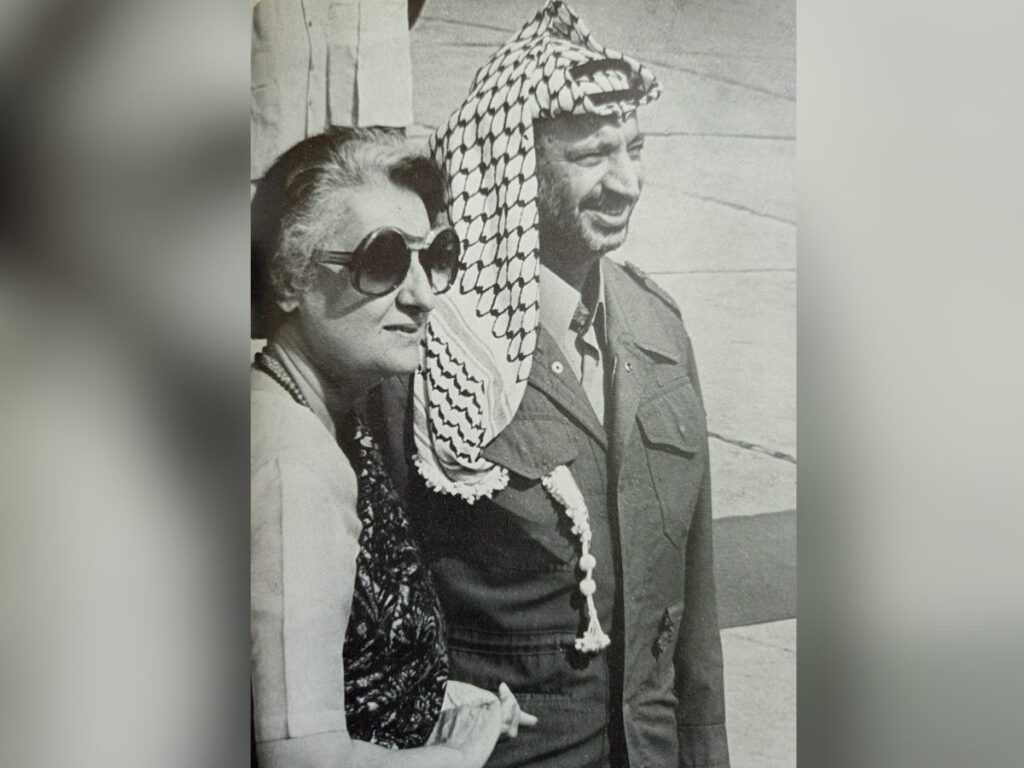
Arafat was a great friend of Indira Gandhi. After her death, her son PM Rajiv Gandhi continued the tradition. In 1988, India became one of the first countries to recognise the ‘State of Palestine’.
In 1993, Israeli Prime Minister Yitzhak Rabin and PLO chief Yasser Arafat signed a deal in the White House in Washington, known as the historic Oslo Accords or the Oslo Agreements. Both leaders recognised each other’s existence and pledged to pave way for a peaceful future and an end to the decade-long conflict. The second Oslo Accord was signed in 1995, which focused on the drawing a boundary between the two countries.
However, the deal fell flat as right-wing Israelis and Palestinian militant groups, Hamas and Islamic Jihad, opposed it. Subsequently, Yitzhak Rabin was assassinated in 1995 by a right-wing Israeli. After his death, the influence of the right wing grew in Israel. Current Prime Minister Benjamin Netanyahu is also a right-wing politician.
India moves closer to Israel
By the 90s, the Indo-Palestine relations faced a few stumbling blocks. India’s focus began to shift from Palestine to Israel. This shift was partly due to India’s diminishing relations with the Arab world during the Indo-China war in 1962, and the Arab support for neighbouring Pakistan during the 1965 and 1971 wars.
Israel had supplied weapons to India during the Sino-Indian war of 1962 and the Indo-Pakistan wars of 1965 and 1971.
PLO lost international support for a separate State when it backed President Saddam Hussein during the 1990 Kuwait war. Moreover, the disintegration of the Soviet Union and the end of the Cold War weakened the Non-Aligned Movement.
In 1992, under Prime Minister P V Narasimha Rao, India established diplomatic ties with Israel by setting up its embassy in New Delhi.
Strengthening ties with Israel
India’s relations with Israel were further cemented during the 1999 Kargil war. It was during this time Israel provided large defence support, like the precision target bombs, to the Indian Air Force which helped win the war.
The then Prime Minister and senior Bharatiya Janata Party (BJP) leader Atal Bihari Vajpayee sent former foreign minister Jaswant Singh to Israel for the first bilateral visit. Senior BJP leader and then Union home minister L K Advani also visited the Jewish State.
Things changed drastically when Narendra Modi became India’s Prime Minister in 2014. India’s relations with Israel became more visible globally.
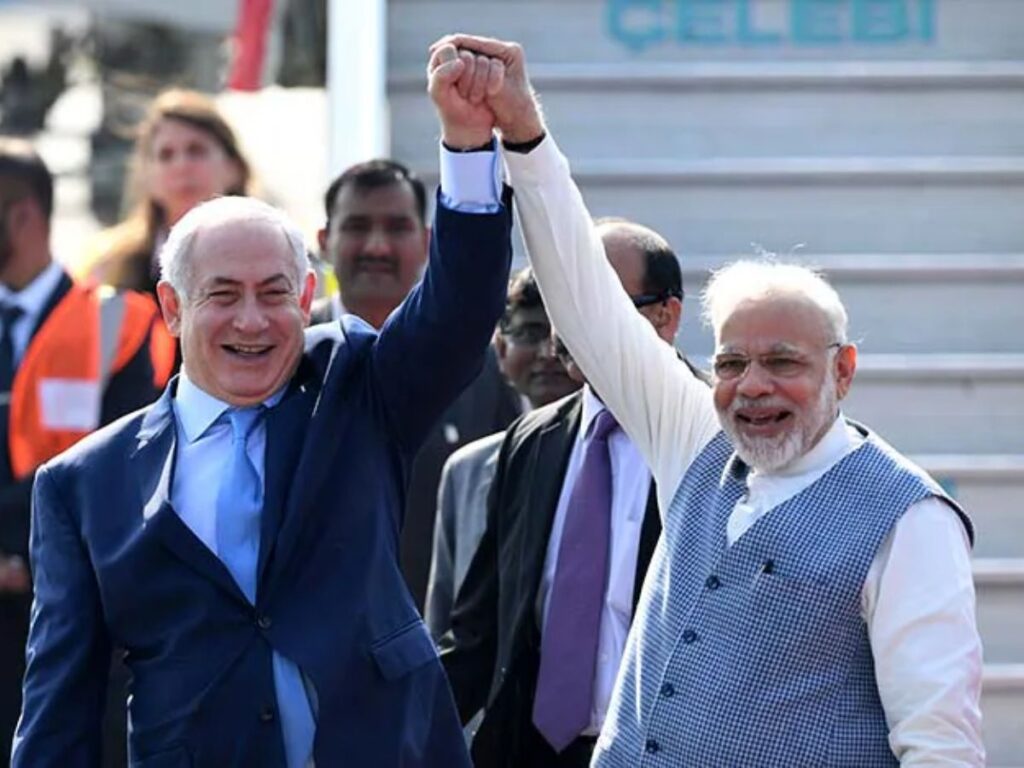
In 2015, India abstained from voting in the UN Human Rights Council that endorsed a report on Israeli war crimes.
In 2017, Modi made his first official visit to Israel and met Prime Minister Benjamin Netanyahu. The significance of his visit was his preference to not visit Palestine, contrary to the tradition of every Indian Prime Minister who had visited Israel. The PMO, however, maintained India’s position on its support towards the Palestinian cause.
Indo-Israel defence ties
The Bibi-Modi “bromance” fully blossomed when Netanyahu welcomed Modi and said, “Aapka swagat hai mere dost [Welcome, my friend]. We love India. We admire your culture, history, democracy and commitment to progress. I am confident of the real mathematics of life, of the success of our partnership for many reasons; talent of our people.”
Modi tweeted, “I for I. Which means India for Israel and Israel for India.”
The Indo-Israel defence ties are one of the strongest bonds the two countries currently share besides oil and gas, transportation and job opportunities.
The Israeli armed forces have presented UAVs, radar systems, surveillance technology as well as anti-aircraft missiles and air-to-air missiles to the Indian defence forces. The two armies regularly engage in joint military operations.
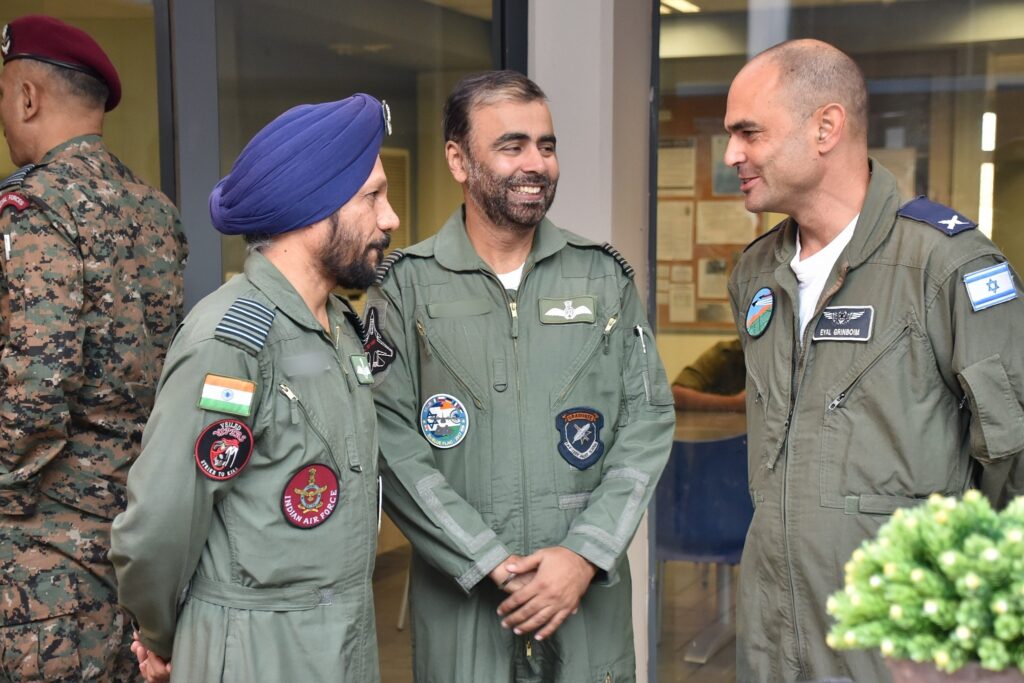
The Israeli army has also provided training modules to defence as well as police forces. According to a report by Al Jazeera, police officers stationed in the Kashmir Valley have been trained at the Israel National Police Academy. Security forces also use Israeli surveillance technology and foliage-penetrating radar.
Prime Minister Narendra Modi and Benjamin Netanyahu’s friendship is a testimony of India’s changing bilateral relationship with Israel in the current world. Both leaders share a common right-wing ideology with majoritarian inclinations.
Erasure of history
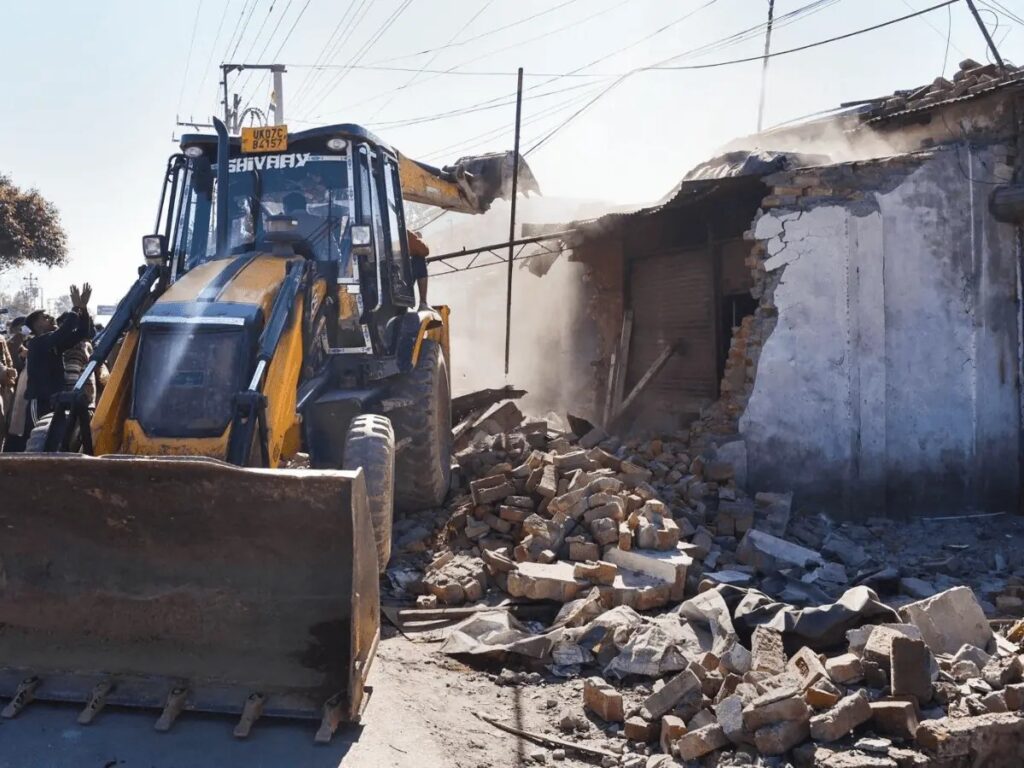
According to an Al Jazeera report, the Modi government finds several inspirations from its Israeli counterpart such as the “erasing Islamic history” from school textbooks, and most crucial, demolition of Muslim houses in Uttar Pradesh, the Kashmir Valley, Madhya Pradesh, Gujarat, New Delhi, Karnataka, and Haryana.
The controversial Citizenship (Amendment) Act, 2019 provides Indian citizenship for non-Muslims who have faced persecution in neighbouring countries. It draws inspiration from the Jewish Nation-State Law.
Hindutva and Zionism have common enemies
Modi’s rise to power has its roots in Rashtriya Swayamsevak Sangh (RSS), a far-right Hindutva organisation that draws its inspiration from Zionism, envisaging Akhand Bharat on the lines of Greater Israel.
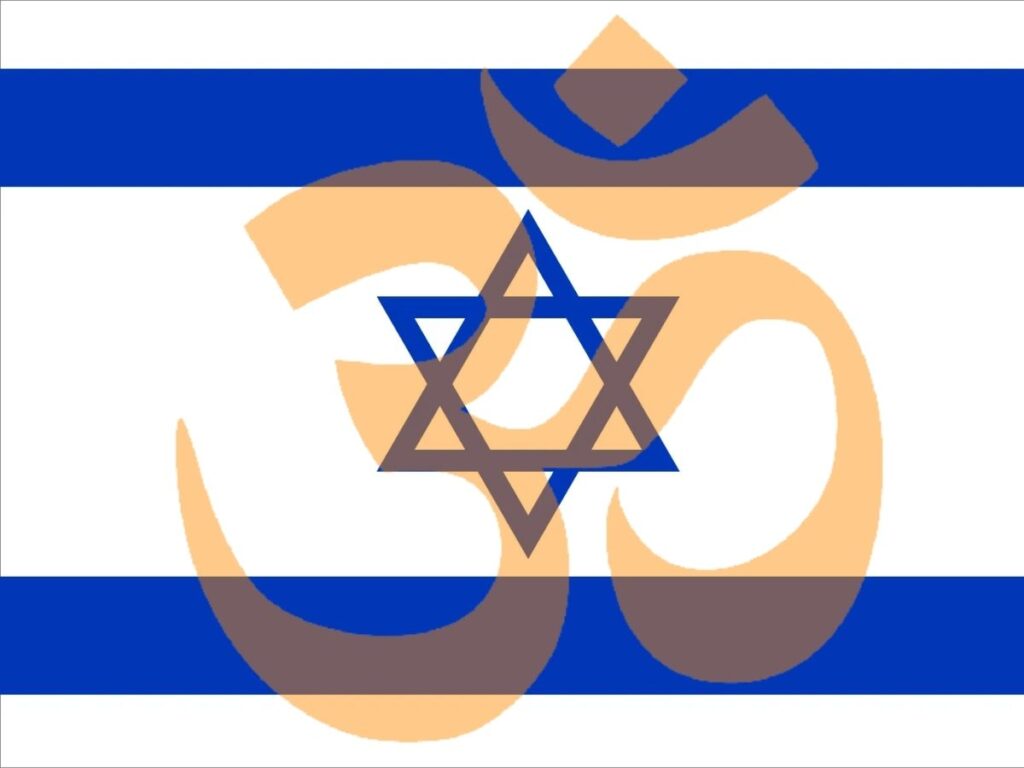
RSS’s founders and Hindutva ideologues — VD Savarkar and MS Gowalkar — expressed sympathies for Jews. According to them, the Jews kept their culture intact and held their nationalism in the form of a Jewish state even after facing persecution by Hitler’s Nazis during the Second World War.
For the RSS founders, Israel was the perfect blueprint for Akhand Bharat or a Hindu Rashtra. In this 2015 article for South Asia: Journal of South Asian Studies, Golwalkar saw in “Jews and Hindus have a shared political problem that stemmed from a clash between the reality of race and the failure of nationhood.” For Gowalkar, Jews living in India were ‘guests’ but Muslims and Christians were called ‘invaders’.
Zionism and Hindutva are similar in many ways. According to an article in Swarajya titled ‘Hindutva And Zionism: Differing In Symbols, Allied In Thought‘, both are cheerleaders of nationalism.
Moreover, followers of Zionism and Hindutva have a constant fear that living under foreign rule and gradual assimilation weakens the sense of identity in their communities — their roots, culture and language.
Another similarity is that both ideologies project Muslims and Christians as enemies. Although India has been historically secular, since 2014 a growing number of Indians are happily embracing fascism.
For example, senior BJP leader Subramaniam Swamy, during a joint panel discussion with Israeli academician Gadi Taub organised by the “Indo-Israel Friendship Association” in Mumbai in August 2019 said, “Zion is today under attack from Islamic extremists, and therefore both of us [Hindutva-vadis and Zionists] should come together to fight the Islamic terror forces.”
He added: “India already is a Hindu Rashtra and going forward there will be changes made in school history books to incorporate more about the fights Hindus won against the Mughals.”
In November 2019, the Indian consul general in New York (currently joint secretary, Europe-West at the Ministry of External Affairs), Sandeep Chakraborty spoke on the abrogation of Article 370. Speaking highly of Israel, he said, “We already have a model in the world, I do not know why we do not follow it. It has happened in the Middle East. If the Israeli people can do it, we can also do it.”
India’s see-saw with Israel, Palestinians
On Sunday, October 22, India started sending medical aid and disaster relief materials to Palestinians. An Indian Air Force C-17 flight carrying nearly 6.5 tonnes of medical aid and 32 tonnes of disaster relief material departed for the El-Arish airport in Egypt.
Issuing statements in support of Israel during current Hamas-Israel conflict and sending humanitarian aid to distressed Palestinians demonstrate how India maintains its relationship with Israel and Palestine.



